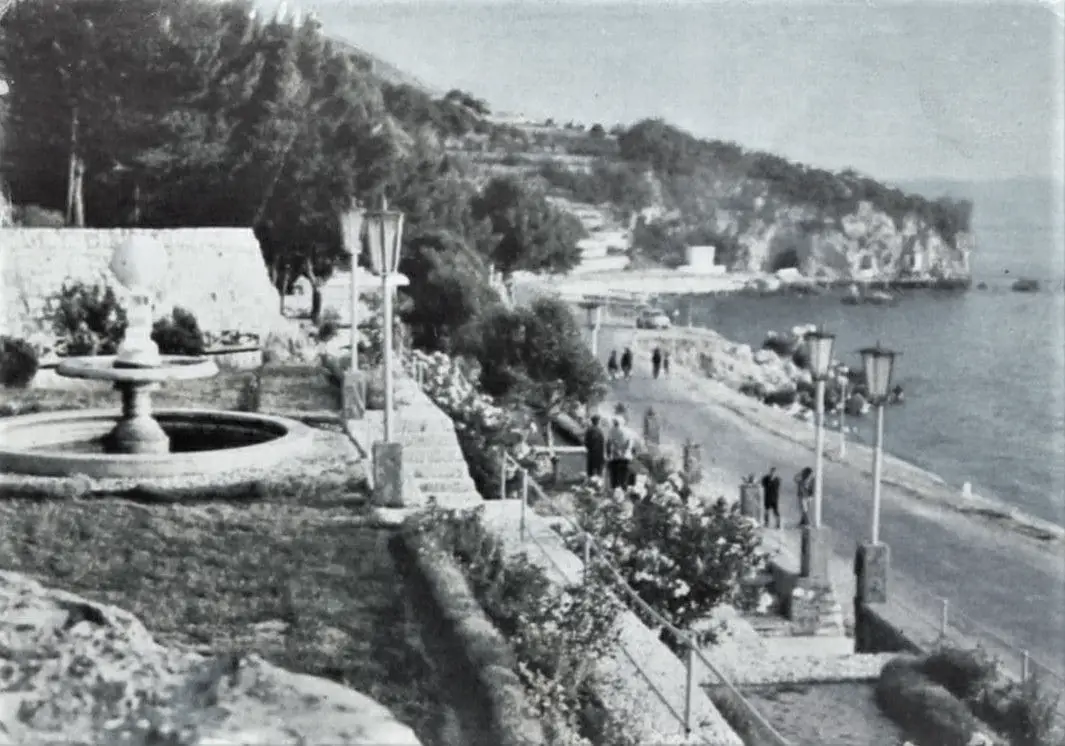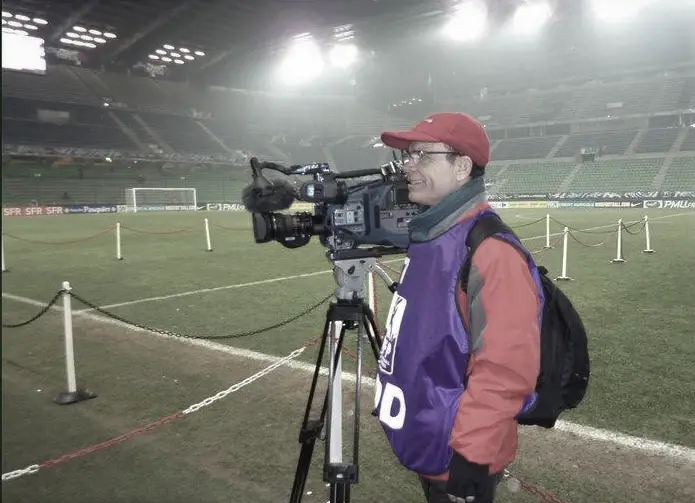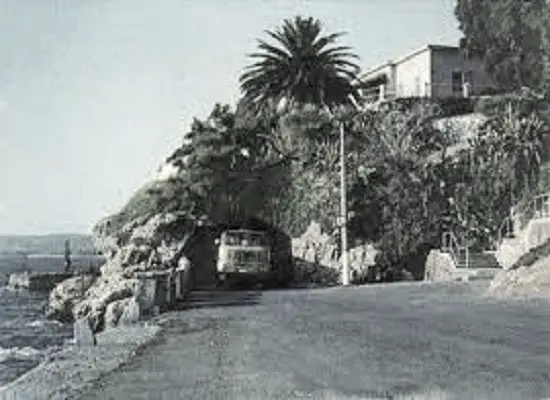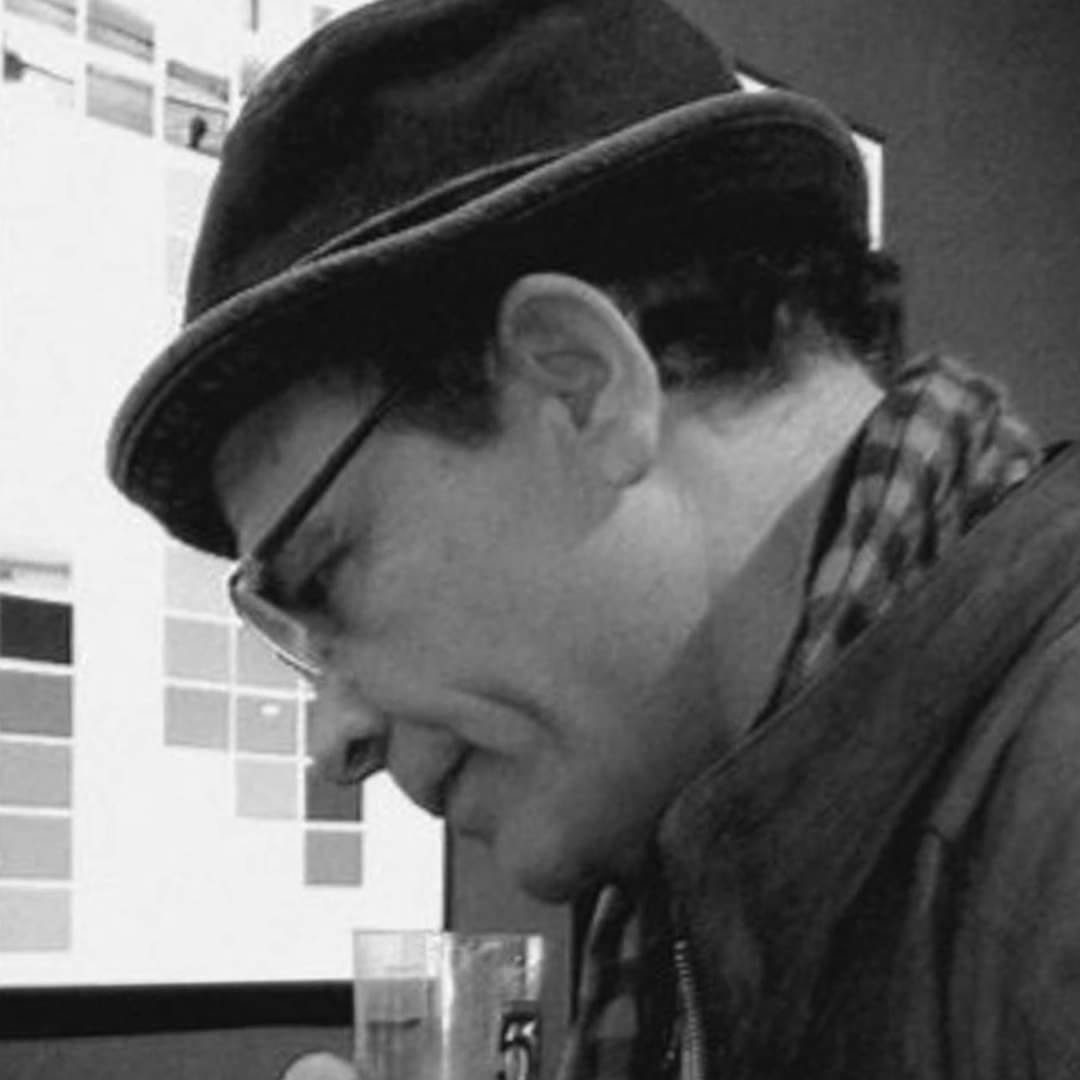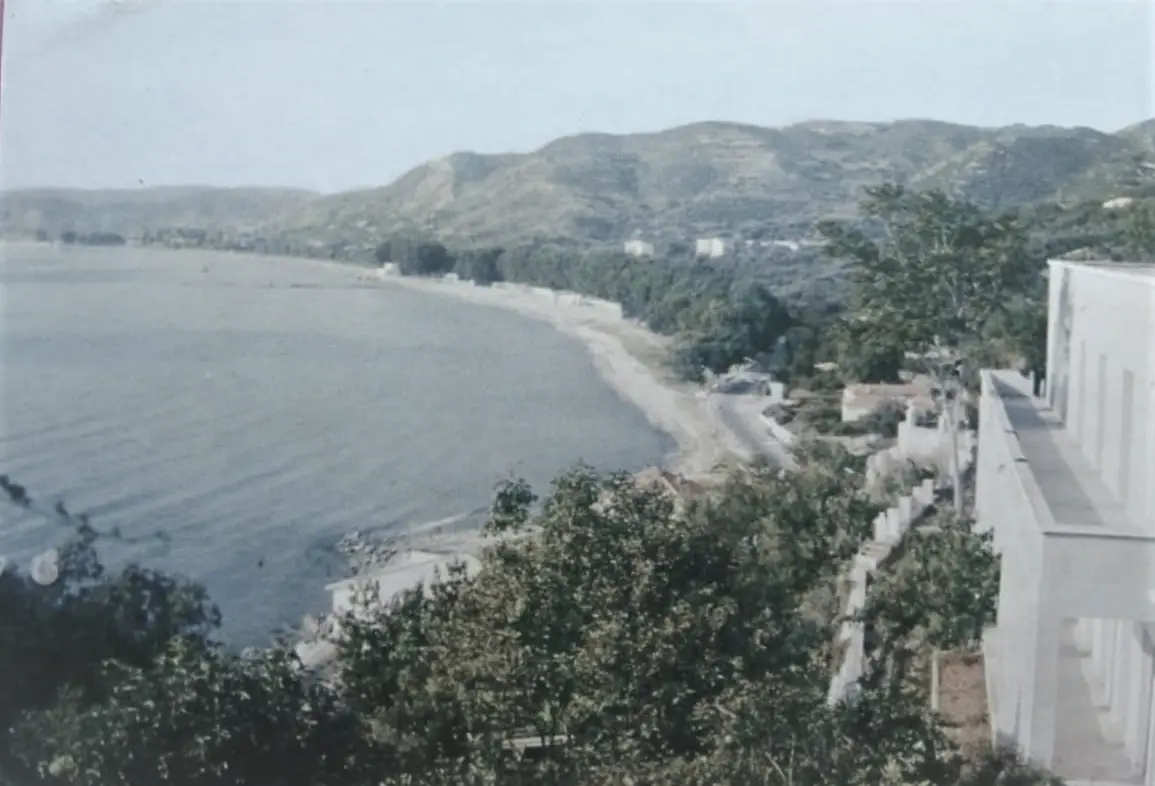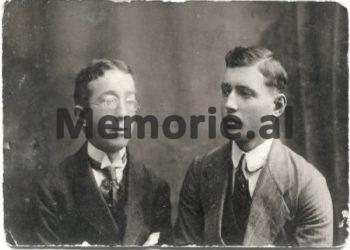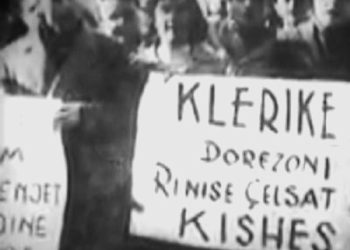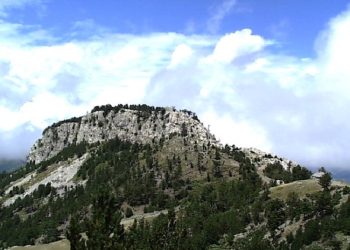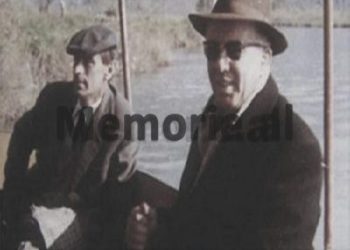By Vasil Qesari
The fourth part
Memorie.al/ The overthrow of the great totalitarian edifice in Albania would leave behind, not only the change of the system, accompanied by a lot of hopes, mirages and cries of happiness, but, unfortunately, also a lot of wounds, drama, victims, dust, milk and so on lies of all kinds. Ten years and more after that event, which deeply shook society, completely overturning many previous codes, rules and concepts, people still continue to ask themselves such questions as: What really happened in society Albanian, during the last 50 years of the dictatorship? How was it possible that the system managed to warp everything? Why did people accept it? What was the totalitarian logic of the transformation of society and the individual? How were the structures of totalitarian mechanisms conceived and functioning: propaganda, secret police and the exercise of the ideology of terror? How did it happen that among all the communist countries of Eastern Europe, Albania was considered an exception or a special case? Why did Enver Hoxha remain blindly, fanatically loyal to Stalin until the end, turning the country into a prison where violence, fear and purges continued until the end of the 80s? Why was the country so insanely isolated, locking people up between bunkers and barbed wire? Why, then, did all the above phenomena happen…?! The book “Post-scriptum for Dictatorship” does not claim to provide definitive answers to the above questions, or the complexity of the reasons that brought and maintained the totalitarian power in Albania. Nor is it a complete, deep and comprehensive fresco of the life and suffering that people experienced during that system. Its author, perhaps, has the merit that together with the retrospective view of the totalitarian period as well as the zeal of a passionate analyst, he has tried to turn his head back once again, to give not only his personal memories and opinions, but also to return once again to the vision of that era with the simple philosophy of preserving the Memory and supporting the Appeal to never forget the well-known maxim, that…the corpse’s nails and hair continue to grow even after death! Ten years or more after the great revolution, the book in question has current value and we hope it will be appreciated by the reader because, as an Albanian researcher also says… the greatest evil that can happen to a people comes when he fails to analyze his own past. An amnesic people are forced to be constantly neuropathic and repeat their painful experiences…!
Continues from last issue
STORY ABOUT THE FIRST SECRETARY
Before entering the office of the first secretary of the Party in the district, you will have to pass through the antechamber of another secretary, who is otherwise called an assistant. In any case, it is only he who enables or accompanies anyone who is authorized to enter the chief’s headquarters. The door to the first secretary’s office is sealed. With special isolation, so that no conversation taking place in it can be heard, even by his own assistant.
Here…! You have been given the opportunity to enter it and observe everything quietly. The regular door opens and a pretty office full of light appears before the eyes. Its floor is covered from corner to corner with a thick cherry-colored carpet. Then, what immediately catches your eye is a large portrait of Enver Hoxha, which occupies most of the page of the opposite wall. Exactly, there is the place where the first secretary sits and works. In the center of the office, there is a neat beech table, where more than twenty people can sit. While, in front of it, the desk of the first secretary takes place, which forms the letter T with that of meetings.
To the left of the office, on a library-type mobile, stands a color television, assembled by our own efforts at the Durrës Radio Television Factory. There, there is also a large radio of the brand ‘Krasnaya Oktober’, left in the inventory of the office, since the distant time of friendship with the Soviets. Further below, some of the industrial products of the district are exhibited: a jar of crude oil, two bags of iodized salt, some electric lamps, a block of bitumen and two or three cans of fish. Meanwhile, the right side is completely occupied by another huge library, with many shelves but few books. In them you can only see some purple blocks of Enver Hoxha’s works, as well as various propaganda brochures.
On the desk of the first secretary, four telephones of different colors are installed. One of them is directly related to the Secretariat of the Central Committee of the Party, in Tirana. Another, with the State Security branch in the district, as well as with the headquarters of the Defense Command. The third, with the Houses of the Party in Cold Water, and the last, with a special line, which makes it possible to communicate directly with any number in Tirana.
But let’s go back to the description of the office of the first secretary. A little further, to the right of the desk, is a large steel safe, the secret door of which is sealed with red wax, right next to the keyhole. On the left side, near the large windows with heavy curtains, there is an intimate corner for receiving friends. A low, black table with a cigarette ashtray on top, accompanied by a wide sofa with three armchairs around it. Other office mobiles are more or less the same. Simple and with walnut wood. Of a model with those found in the offices of other secretaries. In a word, not at all modern, but of a style that can be described as socialist bureaucratic style…!
And here, after a while, the first secretary himself enters the office, accompanied by his assistant, who delicately places a folder with a red cover on the table. He is a man in his fifties. With a little gray on the cheeks. Dressed in a deep blue suit. With a sky-colored shirt, like the ones usually worn by the members of the Political Bureau, which are, generally, gifts from the country’s ambassadors abroad.
The first secretary’s face is clean-shaven. Skin, pink, on white. Lustrous and well nourished. Hair cut short and carefully combed. The first secretary takes care of his appearance. But, well, without exaggeration. It should not look primitive, but neither should it look modern. Nothing should remind him of bourgeois dandyism. Thus, the word falls, about deodorants or other smells, it is not even a question. Only on special occasions, he uses a light aftershave. Of course, he too, a gift from a friend who often travels abroad.
However, the current secretary is very different from his predecessor a few years ago, who often spent days without a razor vein on his cheek and never removed his khaki cap from his bald head. On the verge of retirement, he belonged to the generation of veterans who had been transferred there, from a distant southeastern district. Many people said, in fact, that he had made a career out of the great reputation he had taken up, for organizing strike actions centered on agriculture. Others denied that version, saying that it had to do with the wife of the Great. It was she who had intervened to transfer him to that coastal district. There, where she and her husband spent their family vacations every winter.
(The city of Vlora, with about 70 thousand inhabitants, in the 80s, had only 5-6 telephone communication lines with Tirana. Three were installed in the offices of the first secretary and the chairman of the Executive Committee. One, in the villas of Cold Water and, thirdly, for fulfilling the needs of the people, work centers and various institutions. At that time, the vast majority of people communicated with their relatives in different districts of the country, with the so-called ‘News-calls’ ‘. The alla Lin-Biao cap became particularly “fashionable” during the years of the Cultural Revolution in China. It was first used by Enver Hoxha himself and then, automatically, by members of the Politburo, those of the CQ as well as down to the “base “, by functionaries and militants of the Party).
In the office of the first secretary there is generally absolute silence. It happens that he is inclined towards cooperativeness at the base. Usually, when he is not there, the operational problems of the day are dealt with by the assistant, who spends the official hours making endless phone calls. On the days he is in the office, the first secretary is very busy. He calls incessantly, giving orders more or less like this: “Take care of the tasks of the plan…! How are services in agriculture…? Notify me about job charts…! What you think about doing, reflect well…! I think it would be good for you to act like this…etc”.
When it happens that the phone rings, connected directly to the Leadership in Tirana, the first secretary picks up the receiver hastily and anxiously. He listens without reacting and focused on the climax. When the interlocutor on the other side asks him questions, he answers with exaggerated notes of servility. Facial expressions vary according to the occasion. If it is about any congratulations from above, or any positive article published in the “Voice of the People” that reports on the implementation of the tasks of the plan in his district, it lights up with joy. Then, he immediately reacts with the expressions:
Thanks mate X…! We will continue to work according to the instructions of the Party and Comrade Enver…! In the future we will score even higher results…! Long live the Party…! In cases of criticism, he turns red with sweat, full of embarrassment. He does not try to justify himself, but immediately makes self-criticism. It is committed that it will take urgent measures and that it will punish those who delay the work.
The first secretary spends most of his time in meetings.
Meeting in Tirana, meeting in the apparatus, meeting in the party organizations in the district, etc. Whereas, on quiet days, he starts his official schedule at 8 am. First, by reading the code (secret news instructions from above about various problems of the Party), and then with the bulletin of the Department of Internal Affairs. The morning then continues, with a cursory reading of the main headlines of the central and local press, as well as the bulletin of the Statistics Section in the Executive Committee, which describes in detail the progress of the indicators of the implementation of the plan in agricultural enterprises and cooperatives.
Every Monday, the first secretary has his regular meeting with the head of the Department of Internal Affairs. A tough looking man. With tall stature and a boxer’s body. He reports to him, about the level of vigilance and security in the district, as well as about the events that happened during the past week. Among other things, he also informs about the arrest of two people in the city. A teacher and a carpenter, who carried out agitation and propaganda. Also, I inform you about the exile in a deep mountainous area of a declassified family.
The first secretary listens attentively and approves, nodding his head with satisfaction. He congratulates him on the successful fight against the enemies and advises him to increase his vigilance and surveillance work against them. After the head of Security, a group of veterans enter the office. The first secretary stands up. He hugs them one by one and sits with them at the meeting table. They inform him about the work done in collecting the biographies of the martyrs of the Anti-Fascist National-Liberation War and ask him for allowances and funding, for the comings and goings they have done in the villages. The secretary assures him that everything will be arranged.
Then, a group of four people entered the office, accompanied by the instructor of the Education sector. They are led by the chairman of the League of Writers and Artists Branch, who presents the program of activities in honor of the birthday of the beloved leader Enver Hoxha. (Festive decoration in the city, fine arts exhibition, folklore festival, artistic speech concert by dramatic theater actresses, photo-exhibition in the district museum, etc.).
During such meetings, the first secretary is never absent, to treat his friends to coffee. It is usually served in the office by the bar counter of the Party Committee, which is located on the first floor. In special cases, the assistant brings the coffee and, when it comes to important friends from above, that is from Tirana, and then the degree of honors and respect are special. The first secretary leaves all work, and takes them, first for coffee in Cold Water, and then for lunch at one of the Party Houses.
The first secretary has a new fringo car, of the French brand ‘Peugeot’. It is the most luxurious car that circulates in the city, next to those of the chairman of the Executive Committee, that of the Department of Internal Affairs and three or four other leaders in the district. He uses the “Peugeot” only in places where paved roads pass. For movements within the city, as well as coming and going in Tirana. On the days when he is in the office, he always sees his driver with a sponge and paper towels in his hand. It washes, cleans and polishes the bodywork, windows and seats of the car, which emits glowing reflexes.
As for trips to deep areas, the first secretary uses a vehicle of the Romanian brand “Aro”. In such cases, his clothing also changes, to adapt as best as possible to the climate of the environment where he goes. He wears a green rubber duck sweatshirt with a plush collar, dark corduroy pants, and a cap. In meetings of basic organizations, inspections for the realization of tasks, on occasions of holidays and anniversaries, such modest clothing shows not only simplicity, but also fusion with the people.
The head of the Party in the district, like the other newcomers, lives in a villa by the sea. It is surrounded by high walls and has a large iron gate. Two or three civilians are constantly hovering around her. No doubt, police guards. On the roof of the villa, several different types of antennas have been installed for receiving foreign TV channels. The few people who have had the rare opportunity to enter the interior of the villa (plumbers, electricians, painters or gardeners), intimately show that its surroundings resemble those of bourgeois houses that they have only seen in foreign TV shows.
Inside it, none of the necessary electrical appliances are missing. The heating is done by electricity, the rooms are full of space, comfortable armchairs and furniture made of walnut wood. The family is supplied with food twice a week, directly from the warehouses of the city’s commercial enterprise, while the maid cooks and cleans the house. The meat comes from the best herds of the Vlora River, the fish from the Zvrneci dalan, the pheasants from the export center in the Poros forest, the wine from the special reserve of the leadership comrades in the Narta winery, the honey from Kanina, the citrus fruits from Jonufra e It was closed.
Often, the first secretary works late. This happens during meetings in his office or when he has to prepare for a plenum, conference or important meeting in Tirana. When he comes out of it, he greets his friends in a friendly manner, quietly goes down the stairs and doesn’t forget to give a fist bump to the policeman, who is guarding the outer gate of the committee with a gun. Then, they get into the car and arrive home. He eats dinner, together with his wife and children, if there is no interesting movie on television; he retires to a quiet corner of the living room and takes out the yellow Bulletin from his leather bag. He puts on his glasses, flips through a few pages and, after a while, he feels his eyes getting tired. It’s bedtime. He goes to sleep.
Tomorrow, another regular day of work awaits him, on the difficult front that the Party has entrusted to him…!
(The “yellow bulletin” of ATSH.-Albanian Telegraphic Agency-Secret bulletin for “internal use”, which was published for the leadership of the high cadres of the ruling Party. It contained comments from foreign media on Albania as well as news, information about various international events, which were never published in the press of the time).
S.S. GOOD FRIEND’S CAREER
Good friend S.S. he started his career in the Party from scratch.
His parents had moved from the village to the city there from the beginning of the 60s, when his father, due to the intervention of a distant cousin, a senior officer in Tirana, who wore a captain (storekeeper), in a military department. S.S., who was accepted into the ranks of the Party, during his military service, then started working as a brigadier in a mountain agricultural enterprise. After 4 years of work, due to his good biography (his uncle was a Martyr of the Anti-Fascist National-Liberation War) and, since he had graduated from the Agricultural School by correspondence, he was appointed deputy secretary of the Party’s basic organization in the enterprise.
During that period, in his annual characteristic, which was sent to the Cadre office of the district Executive Committee, he was consistently described as a model cadre. Pious, loyal, simple and who worked with all the energy to implement the teachings of the Party and Comrade Enver. But the leadership comrades in the district discovered his exemplary qualities quite by accident. Exactly, during a lavishly organized lunch, on the occasion of the 10th anniversary of the establishment of the enterprise, where S.S. you had kept your word. During that lunch, S.S. you hadn’t sat down for even a minute. He was constantly on the move.
Dynamic, unsophisticated, smiling and restless, he used to bring it to the kitchen, so that the table of his friends from the center would not miss anything…! After two months, to everyone’s surprise, comrade S.S. came the decision to transfer and, at the same time, to be appointed chairman in an Agricultural Cooperative very close to the city. For him, this is also the first step towards the career he so dreamed of. Of course, he feels satisfied, but not to the end. Therefore, it continues to work even more. Where you see it most necessary. The name and the opinion about it should be as positive and of good reputation not only among the communists, but also among the cooperatives. This is the reason why, every time he goes to the field or the mountain, among the livestock farmers, he hugs the villagers, gives them a cigarette from his pack and asks them in turn about the health of their families.
But Comrade S.S. behaves quite differently with subordinates. With financiers, agronomists, veterinarians and brigadiers. With them he is haughty, harsh and often even arrogant. And this, according to him, is logical. Because the Party has appointed a leader and entrusted him with that task, not to tolerate and remain indifferent, but to be as demanding and strict as possible in the fulfillment of his duties. Friend S.S. is not one of those people who is satisfied with a little. Being the cooperative president, for him, is only the first step towards the future. He looks away. He makes plans and dreams of becoming someone. Take an important place in society. But, he is also aware that his success, especially his career, does not depend on him. It is in the hands of other people. Those who work at the top, in the Party Committee and, precisely, the secretary who covers the framework.
In addition, comrade S.S. henceforth, he starts to select his associations and friendships even better. Always, in view of his ambitious projects, he thinks he should work with clearer objectives. Find ways and means to have a high-level support in the Party Committee. And, the opportunity to create it, comes. First, he begins to become even friendlier with the instructor who covers the problems of agriculture. He exchanges family visits, invites him to his birthday dinner and, occasionally, with his driver, brings home meat, fruit and vegetables from the cooperative. Then, with the help of his instructor friend, he begins to communicate amicably with his friend Y.D., the secretary who covers the cadre. Memorie.al
The next issue follows




